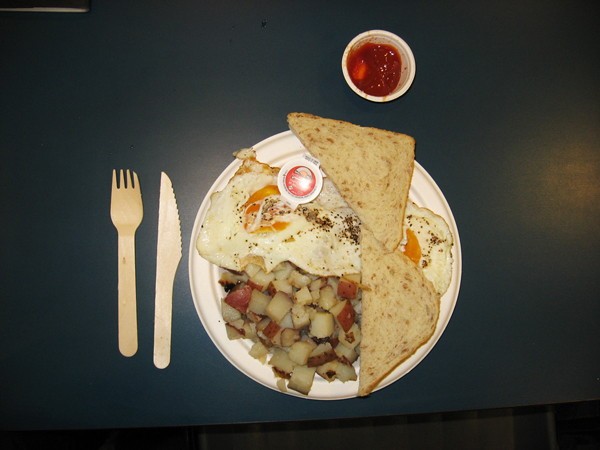Eating on campus at the University of Winnipeg
Diversity Food Services may be ethical and sustainable, but is their food any good?
In a downtown campus bent on urban renewal and community integration, and in a neighbourhood famous for cultural diversity and some of Canada’s best ethnic food, the shift from Chartwells to Diversity Food Services at the University of Winnipeg makes perfect sense.
But does it taste good?
The goal was to eat three square meals at Diversity Food Services and review the food quality, steering away from the political mumbo-jumbo of sustainability, ethical employment practices and healthy eating.
The price for nearly every serving at Diversity is a big draw. Always around the five-dollar mark, it’s easy to be tempted to indulge at the three food service locations on campus.
Pangea, at Riddell Hall, has a small selection that contradicts the title of the new food service provider. Diversity was lacking in the cafeteria with bare countertops and poorly-stocked pastry cabinets.
The appearance of the cafeteria is a little chaotic, with shipping boxes torn open revealing bags of organic potato chips.
The menu is displayed on flat-screen video screens next to a constant run of Iron Chef on the Food Network.
Diners at Pangea are given the option of take-away or dine-in, though both options use a compostable kind of Styrofoam. The take-away option has a lid.
Cutlery can be either stainless steel or, for the Crusoe in diners, wooden utensils are available.
The breakfast menu at Pangea also gave little in the way of diversity. A choice is offered of a two-egg breakfast (no meat), huevos rancheros or a breakfast sandwich, which is basically the two-egg breakfast stuffed onto a bagel.
The two-egg breakfast, served on a paper plate, boasts free-range eggs, one piece of toast and a heap of potatoes.
The eggs, ordered over-medium, appeared on the deck of the cafeteria line amongst three other identical plates.
An inquiry as to which plate contained the over-medium eggs elicited a response from my breakfast chef of: “Uh … That one, I think.”
The one-in-three chance ended poorly when the eggs were found to be quite runny, though the yolk was richly yellow.
Surprisingly, the breakfast chef had taken the liberty to season the eggs during preparation, which yielded a painful saltiness that was only barely tolerable next to the undercooked and desperately under-seasoned mountain of potatoes next door. The single piece of toast was limp, dry and cold.
The assurance that the eggs were ethically raised weighed pretty lightly when they were quietly dumped in the compost bin and the day started on an empty stomach.
At Café Bodhi, where espresso is served, fortification was provided by a weak, but not foul espresso served in a Dixie Cup. By the time the fair-trade coffee reached the counter it was lukewarm in the wax cup, but still lacked the sourness that seems endemic of Winnipeg’s paltry selection of quality espresso.
At lunch a free-range chicken quesadilla, served mysteriously without chicken, was returned and kindly replaced. It contained a spattering of grated cheddar, some flavourful bits of dark thigh meat and some crisp, surprisingly fresh peppers. The fresh tomato salsa was a mild condiment, though the meal was a little under-portioned to be considered a meal.
Also at lunch, a generous portion of elk stew on rice is served, a steaming hearty dish that, while lacking seasoning, is a surprising and comforting meal. The meat showed no signs of pre-stewing searing, an essential for caramelizing the surface to develop meaty flavour.
Dinner options include a beef burger, chickpea curry and “Sunpeak” chicken tenders.
Unlike breakfast and lunch options, dinner materialized quite quickly (though the open kitchen betrayed the secret that none of the food was cooked to order).
The burger, served with everything (one can refuse mayonnaise on request) was dwarfed by the large, compostable take-out container and appeared decidedly less generous than the image that the video-menu boasted.
Despite its diminutive size, the burger was cooked well, not dry, accompanied by fresh, ripe tomatoes and crisp lettuce. The bun, like the morning’s toast, was limp and cool.
The chickpea curry was enough to feed any large mammal, and though the chickpeas were undercooked and crunchy (an unforgivable sin for those with sensitive bowels), the dish tasted fine with a little salt and pepper.
In terms of flavour and quality, the laughably small portion of chicken strips ranks highest, with a wholesome homemade batter and tender chicken. The accompanying honey dill sauce was nearly unnecessary for enhancing the dish. Unfortunately, the three little strips, priced at five dollars, would barely feed a toddler at snack time.
The food offered at Diversity Food Services doesn’t improve on its much-maligned predecessor Chartwells. While it ensures local ingredients, admirable employment practices and lower price points, it sacrifices taste and flavour for a patron’s sense of well-being.
Common for our era when “green” causes are championed, the new food service at the U of W is serving feel-good causes that distract consumers from the food itself.
Diversity Food Services faces the challenge of trying to encourage students, faculty and community members to eat better. Unfortunately, “better” means better for the compost heap, and not better for the palate.
One can only hope that Diversity is simply getting its feet about it and settling into the groove of a new menu. And hope, we can only hope, that it will not disappoint.
Published in Volume 64, Number 7 of The Uniter (October 15, 2009)






